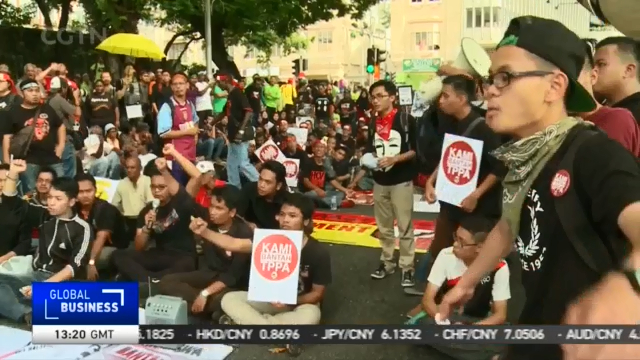
22:45, 06-Sep-2018
CPTPP Ratification: Last-minute pressure on Malaysia over deal
Updated
22:18, 09-Sep-2018
03:02

After years of negotiations and surviving the US's withdrawal, the revamped Trans-Pacific Partnership agreement – now the CPTPP – seemed to be on solid ground. But an unexpected change of government in signatory country Malaysia has created new uncertainties. The CPTPP is facing opposition from Malaysian activists and is also dividing senior economic advisers, business leaders and trade officials. And as Rian Maelzer reports from Kuala Lumpur, Prime Minister Mahathir Mohamad's position on the trade agreement is far from certain.
The Trans-Pacific Partnership or CPTPP has been signed, sealed but not yet delivered, with Malaysia's parliament yet to ratify it. Opposition to the deal has come both from left wing social activists and right wing Malay nationalists. And since his shock election victory in May, Prime Minister Mahathir Mohamad has also said he worries the deal favors the more developed countries. Jomo Sundaram was advising Mahathir as a member of his Council of Eminent Persons' and opposes ratification. He says he's worried about the power it gives corporations to sue governments as well as the stiffening of intellectual property rights.
PROFESSOR JOMO SUNDARAM SENIOR ECONOMIST "This is going to raise the costs of medicines which are already prohibitively expensive and it's going to undermine the likelihood of poorer countries achieving their commitments to universal health coverage."
REBECCA FATIMA STA. MARIA FORMER SEC. GEN. MINISTRY OF INTERNATIONAL TRADE "All the concerns that we have, we have taken them into account in the negotiations. A lot of concessions were made for us."
Rebecca Santa Maria helped negotiate the TPP.
REBECCA FATIMA STA. MARIA, FORMER SEC. GEN. MINISTRY OF INTERNATIONAL TRADE "It's about the long term and Malaysia is such an open economy we cannot afford not to be involved in a forum or in an agreement where the rules are being written because if you are not there writing the rules you'll be subjected to those rules anyway."
Business groups are also pushing the government to ratify, but opponents remain unconvinced of the benefits especially with preferential access to the US market no longer part of the deal.
PROFESSOR JOMO SUNDARAM SENIOR ECONOMIST "I feel that we are participating in an ostensible trade agreement which actually does not confer any significant benefits in terms of economic growth but, conversely, adversely affects the welfare of the people. Particularly the welfare of those countries which are going to rely very heavily on foreign investments as well as foreign trade."
RIAN MAELZER KUALA LUMPUR "Prime Minister Mahathir, for his part, has seemed to shift tack more recently, suggesting that Malaysia would lose credibility if it fails ratify the CPTPP at this late stage. Rian Maelzer, CGTN, KUALA LUMPUR."

SITEMAP
Copyright © 2018 CGTN. Beijing ICP prepared NO.16065310-3
Copyright © 2018 CGTN. Beijing ICP prepared NO.16065310-3